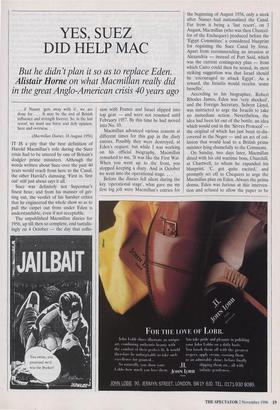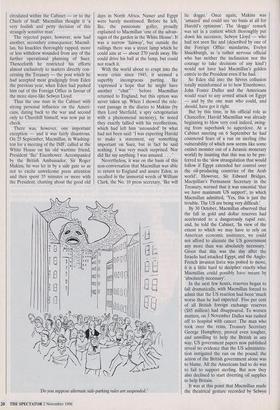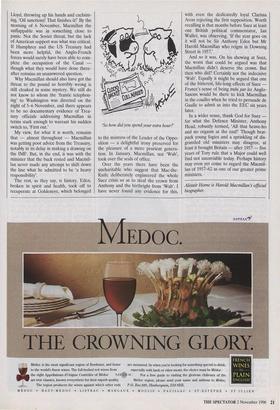YES, SUEZ
DID HELP MAC
But he didn't plan it so as to replace Eden.
Alistair Horne on what Macmillan really did
in the great Anglo-American crisis 40 years ago
. . . if Nasser 'gets away with it', we are done for . . . It may be the end of British influence and strength forever. So, in the last resort, we must use force and defy opinion, here and overseas. . . .
(Macmillan Diaries, 18 August 1956)
IT IS a pity that the best definition of Harold Macmillan's role during the Suez crisis had to be uttered by one of Britain's dodgier prime ministers. Although the words written about Suez over the past 40 years would reach from here to the Canal, the other Harold's damning, 'First in, first out' still just about says it all.
Suez was definitely not Supermac's finest hour, and from his manner of get- ting out, the verdict of his harsher critics that he engineered the whole show so as to pull the carpet out from under Eden is understandable, even if not acceptable.
The unpublished Macmillan diaries for 1956, up till then so complete, end tantalis- ingly on 4 October — the day that collu- sion with France and Israel slipped into top gear — and were not resumed until February 1957. By this time he had moved into No. 10.
Macmillan advanced various reasons at different times for this gap in the diary entries. Possibly they were destroyed, at Eden's request; but while I was working on his official biography, Macmillan remarked to me, 'It was like the First War. When you went up to the front, you stopped keeping a diary. And in October we went into the operational stage. . . . '
Before the diaries fell silent during the key 'operational stage', what gave me my first big jolt were Macmillan's entries for the beginning of August 1956, only a week after Nasser had nationalised the Canal. Far from it being a 'last resort', on 3 August, Macmillan (who was then Chancel- lor of the Exchequer) produced before the `Egypt Committee' a considered blueprint for regaining the Suez Canal by force. Apart from recommending an invasion at Alexandria — instead of Port Said, which was the current contingency plan — from which Cairo could then be seized, its most striking suggestion was that Israel should be 'encouraged to attack Egypt'. As a reward, the Israelis would receive 'some benefits'.
According to his biographer, Robert Rhodes James, Eden was 'very shocked'. and the Foreign Secretary, Selwyn Lloyd, was instructed to urge the Israelis to take no immediate action. Nevertheless, the idea had been let out of the bottle; an idea which would end in the 'Sevres Protocol' the original of which has just been re-dis- covered in the Negev — and an act of col- lusion that would lead to a British prime minister lying shamefully to the Commons.
On Sunday, two days later, Macmillan dined with his old wartime boss, Churchill, at Chartwell, to whom he expanded his blueprint. 'C. got quite excited,' and promptly set off to Chequers to urge the Macmillan plan on Eden. Always the prima donna, Eden was furious at this interven- tion and refused to allow the paper to be circulated within the Cabinet — or to the Chiefs of Staff. Macmillan thought it 'a very foolish and petty decision of this strangely sensitive man'.
The rejected paper, however, now had another, secondary consequence; Macmil- lan, his knuckles thoroughly rapped, more or less withdrew wounded from any of the further operational planning of Suez. Thenceforth he restricted his efforts almost exclusively to matters directly con- cerning the Treasury — the post which he had accepted most grudgingly from Eden the previous year, when Eden had pushed him out of the Foreign Office in favour of the more slave-like Selwyn Lloyd.
Thus the one man in the Cabinet with strong personal influence on the Ameri- cans, dating back to the war and second only to Churchill himself, was now put in check.
There was, however, one important exception — and it was fairly disastrous. On 25 September, Macmillan, in Washing- ton for a meeting of the IMF, called at the White House on his old wartime friend, President 'Ike' Eisenhower. Accompanied by the British Ambassador, Sir Roger Makins, he was let in by a side gate so as not to excite unwelcome press attention and then spent 35 minutes or more with the President, chatting about the good old days in North Africa. Nasser and Egypt were barely mentioned. Before he left, Ike, the passionate golfer, proudly explained to Macmillan 'one of the advan- tages of the garden in the White House'. It was a narrow 'fairway', but outside the railings there was a street lamp which he could aim at — about 270 yards away. He could drive his ball at the lamp, but could not reach it.
With the world about to erupt into the worst crisis since 1945, it seemed a superbly incongruous parting. Ike `expressed a hope that he might have another "chat" ' before Macmillan returned to England, but this option was never taken up. When I showed the rele- vant passage in the diaries to Makins (by then Lord Sherfield, a spry octogenarian with a phenomenal memory), he noted they exactly tallied with his recollections, which had left him 'astounded' by what had not been said: 'I was expecting Harold to make a statement, say something important on Suez, but in fact he said nothing. I was very much surprised. Nor did Ike say anything. I was amazed. . . '
Nevertheless, it was on the basis of this non-conversation that Macmillan was able to return to England and assure Eden, as recalled in the immortal words of William Clark, the No. 10 press secretary, 'Ike will Do you suppose alternate side-parking rules are suspended.' lie doggo.' Once again, Makins was `amazed' and could see `no basis at all for Harold's optimism'. The `doggo' remark was set in a context which thoroughly put down his successor, Selwyn Lloyd — who had not seen Ike and (described by one of the Foreign Office mandarins, Evelyn Shuckburgh, as 'a rather nervous official who has neither the inclination nor the courage to take decisions of any kind') would not have had Macmillan's golden entrée to the President even if he had.
So Eden slid into the Sevres collusion totally misinformed as to how Eisenhower, John Foster Dulles and the Americans would react to any armed attack on Egypt — and by the one man who could, and should, have got it right.
But by this time, in his official role as Chancellor, Harold Macmillan was already beginning to blow very cool indeed, swing- ing from superhawk to superdove. At a Cabinet meeting on 6 September he had countered fears of a run on sterling (the vulnerability of which now seems like some extinct monster out of a Jurassic monetary world) by insisting that this was to be pre- ferred to the 'slow strangulation that would follow if Egypt extended her control over the oil-producing countries of the Arab world'. However, Sir Edward Bridges, Macrytillan's Permanent Secretary in the Treasury, warned that it was essential 'that we have maximum US support', to which Macmillan admitted, 'Yes, this is just the trouble. The US are being very difficult.'
By 30 October, Macmillan observed that the fall in gold and dollar reserves had accelerated to a dangerously rapid rate, and, he told the Cabinet, 'In view of the extent to which we may have to rely on American economic assistance, we could not afford to alienate the US government any more than was absolutely necessary.' Given that this was the day after the Israelis had attacked Egypt, and the Anglo- French invasion force was poised to move, it is a little hard to decipher exactly what Macmillan could possibly have meant by `absolutely necessary'.
In the next few hours, reserves began to fall dramatically, with Macmillan forced to admit that the US reaction had been 'much worse than he had expected'. Five per cent of all British foreign exchange reserves ($85 million) had disappeared. To worsen matters, on 3 November Dulles was rushed off to hospital with cancer. The man who took over the reins, Treasury Secretary George Humphrey, proved even tougher, and unwilling to help the British in any way. US government papers now published reveal no evidence that the US administra- tion instigated the run on the pound; the action of the British government alone was to blame. All the Americans had to do was to fail to support sterling. But now they also declined to start diverting oil supplies to help Britain.
It was at this point that Macmillan made the theatrical gesture recorded by Selwyn Lloyd, throwing up his hands and exclaim- ing, 'Oil sanctions! That finishes it!' By the morning of 6 November, Macmillan the unflappable was in something close to panic. Not the Soviet threat, but the lack of American support was what was critical. If Humphrey and the US Treasury had been more helpful, the Anglo-French forces would surely have been able to com- plete the occupation of the Canal though what they would have done there- after remains an unanswered question.
Why Macmillan should also have got the threat to the pound so horribly wrong is still cloaked in some mystery. We still do not know to whom the 'frantic telephon- ing' to Washington was directed on the night of 5-6 November, and there appears to be no documentary evidence of Trea- sury officials addressing Macmillan in terms stark enough to warrant his sudden switch to, 'First out.'
My view, for what it is worth, remains that — almost throughout — Macmillan was getting poor advice from the Treasury, notably in its delay in making a drawing on the IMF. But, in the end, it was with the minister that the buck rested and Macmil- lan never made any attempt to shift down the line what he admitted to be 'a heavy responsibility'.
The rest, as they say, is history. Eden, broken in spirit and health, took off to recuperate at Goldeneye, which belonged `So how did you spend your extra hour?'
to the mistress of the Leader of the Oppo- sition — a delightful irony preserved for the pleasure of a more prurient genera- tion. In January, Macmillan, not Wab', took over the seals of office.
Over the years there have been the uncharitable who suggest that Mac-the- Knife deliberately engineered the whole Suez crisis so as to steal the crown from Anthony and the birthright from Wab'. I have never found any evidence for this, with even the dedicatedly loyal Clarissa Avon rejecting the first supposition. Worth recalling is that months before Suez at least one British political commentator, Ian Waller, was observing, 'If the year goes on it will not be Sir Anthony Eden but Mr Harold Macmillan who reigns in Downing Street in 1957.'
And so it was. On his showing at Suez, the worst that could be argued was that Macmillan didn't deserve the crown. But then who did? Certainly not the indecisive `Wab'. Equally it might be argued that one of the bitterest, life-long effects of Suez France's sense of being trahi par les Anglo- Saxons would be there to kick Macmillan in the couilles when he tried to persuade de Gaulle to admit us into the EEC six years later.
In a wider sense, thank God for Suez for what the Defence Minister, Anthony Head, robustly termed, 'All that heave-ho and no orgasm at the end!' Though brat- pack young fogies and a sprinkling of dis- gruntled old ministers may disagree, at least it brought Britain — after 1957 — five years of Tory rule that a Major could well find not unenviable today. Perhaps history may even yet come to regard the Macmil- lan of 1957-62 as one of our greater prime ministers.
Alistair Home is Harold Macmillan's official biographer.




















































































 Previous page
Previous page